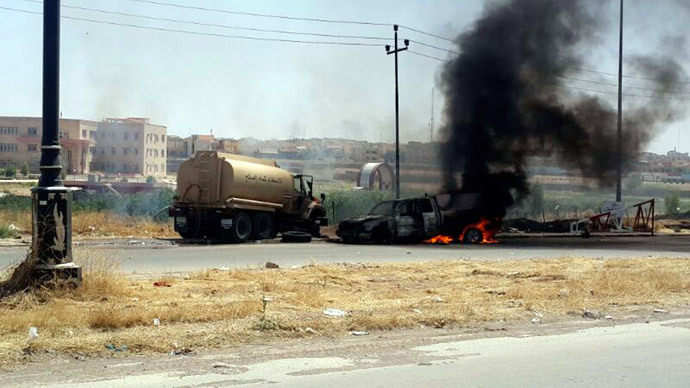'Security conference on Iraq is needed, but without the US and the UK'

The problem of security in the Middle East region has to be sorted out, maybe with some kind of conference that does not allow the Americans or the British to be involved, journalist Afshin Rattansi told RT.
RT:What does this latest incident say about the overall situation in Iraq?
Afshin Rattansi: It’s a landmark event. We have known for quite a while thousands of families have been fleeing the Al-Qaeda linked attacks, but now after this long sequence of events from 9/11, what the whole of Iraq was about, we ended up with Al-Qaeda linked organizations in charge of military helicopters over Iraq. They have taken over the second or third largest city, but it's the commercial hub region of Iraq. This is of huge importance. It is already raising questions in Washington because there were US trained personnel who had to flee for their lives and now we have Al-Qaeda linked people in the stronghold of Iraq. That is the result of the Iraq war.
RT:Do you think Iraq will be able to get a grip on its security any time soon?
AR: The idea that Iraq can possibly have security whilst the Americans and the British have been supporting Al-Qaeda linked operatives, either directly or indirectly (of course there have been no admissions, but we have heard all the statements in Syria, and there is where the overspill is occurring), this is that result. So the idea that security in Iraq was ever going to be held by the Anglo-American invasion of 2003 was one thing. Now we have Anglo-American sponsored, Saudi sponsored instability because these groups are the spillover of the very groups we have been hearing in Britain that we should be supporting. Security in that region has to be sorted out maybe with some kind of conference that does not allow the Americans or the British to be involved. They have singularly failed there and what has to be done of course is to try and have allies in this region, to try and stop these Salafist forces, not alone telling Saudi Arabia to stop funding them.
RT:How can the violence be curbed? Is foreign assistance needed?
AR: We probably all know the lessons of the past. The Americans were supporting both sides in the Iran-Iraq war, then they supported Saddam Hussein and then they supported the people against Saddam Hussein. To any alien from outer space [it would seem that] they want constant volatility. What we need is an urgent conference of the key partners of that region, not involving the US, which cannot be trusted to be able to eradicate the scourge of these Al-Qaeda linked militants as soon as possible because there is no doubt about this. The fact that they have these military helicopters, the fact that Osama al-Nujaifi, the Parliamentary speaker in Baghdad said that this is a threat to the entire region now that they have air forces, then there needs to be this urgent conference. And it is clear that the rebels in Syria were being supported by the British and the Americans, and this is what they have again ripped. It’s the game that we are getting, it’s the same mujahidin play and this time Al-Qaeda and the so-called ISIS now have a key base right there in the heart of the Middle East.
The statements, views and opinions expressed in this column are solely those of the author and do not necessarily represent those of RT.
The statements, views and opinions expressed in this column are solely those of the author and do not necessarily represent those of RT.













